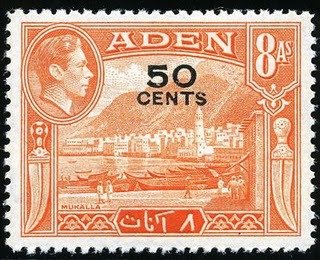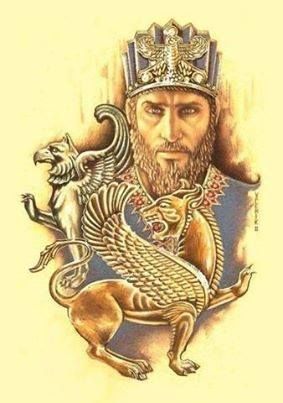Stamp: Mukalla Coaling station (Aden 1951)
Mukalla Coaling station (Aden 1951)
01 October (Aden ) within release Definitive goes into circulation Stamp Mukalla Coaling station face value 50 East African cent
| Stamp Mukalla Coaling station in catalogues | |
|---|---|
| Michel: | Mi:AD 42 |
| Yvert et Tellier: | Yt:AD 41 |
Stamp is square format.
new value overprintAlso in the issue Definitive:
- Stamp - Mukalla Coaling station face value 50;
- Stamp - Capture of Aden face value 70;
- Stamp - Dhow face value 1;
- Stamp - Harbour of Aden face value 2;
- Stamp - Camel Corps face value 5;
- Stamp - Capture of Aden face value 10;
- Stamp - Harbour of Aden face value 5;
- Stamp - Mosque of Aidrus face value 10;
- Stamp - Mukalla Coaling station face value 15;
- Stamp - Capture of Aden face value 20;
- Stamp - Mukalla Coaling station face value 30;
|
Data entry completed
60%
|
|
|---|---|
| Stamp Mukalla Coaling station in digits | |
| Country: | Aden |
| Date: | 1951-10-01 |
| Print: | Recess |
| Perforation: | line 12½ |
| Emission: | Definitive |
| Format: | Stamp |
| Face Value: | 50 East African cent |
Stamp Mukalla Coaling station it reflects the thematic directions:
Rowing is the act of propelling a human-powered watercraft using the sweeping motions of oars to displace water and generate reactional propulsion. Rowing is functionally similar to paddling, but rowing requires oars to be mechanically attached to the boat, and the rower drives the oar like a lever, exerting force in the same direction as the boat's travel; while paddles are completely hand-held and have no attachment to the boat, and are driven like a cantilever, exerting force opposite to the intended direction of the boat.
King is the title given to a male monarch in a variety of contexts. The female equivalent is queen regnant (while the title of queen on its own usually refers to the consort of a king). In the context of prehistory, antiquity and contemporary indigenous peoples, the title may refer to tribal kingship. Germanic kingship is cognate with Indo-European traditions of tribal rulership (c.f. Indic rājan, Gothic reiks, and Old Irish rí, etc.) In the context of classical antiquity, king may translate Latin rex or either Greek archon or basileus. In classical European feudalism, the title of king as the ruler of a kingdom is understood as the highest rank in the feudal order, potentially subject, at least nominally, only to an emperor (harking back to the client kings of the Roman Empire). In a modern context, the title may refer to the ruler of one of a number of modern monarchies (either absolute or constitutional). The title of king is used alongside other titles for monarchs, in the West prince, emperor, archduke, duke or grand duke, in the Middle East sultan or emir; etc. Kings, like other royalty, tend to wear purple because purple was an expensive color to wear in the past.


